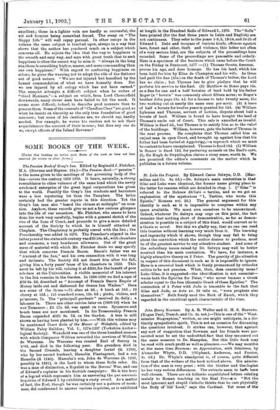SOME BOOKS OF THE WEEK.
[Under this heading we notice such Books of the week as have not beim reserved for review in other forms.]
The Pension Book of Gray's Inn. Edited by Reginald J. Fletcher, M.A. (Stevens and Haynes. 21s.)-The Pension Book-" pension " is the name given to the meetings of the governing body of the Inn-covers the century 1569 1669. It bears, naturally, a strong resemblance to other volumes of the same kind which the newly awakened enterprise of the great legal corporations has given to the world. Possibly the Gray's Inn students and barristers were a less roystering lot than the Templars. The latter certainly had the greater repute in this direction. Yet the Gray's Inn men also " heard the chimes at midnight" on occa- sion. Aayhow, these records give us not a few curious glimpses into the life of our ancestors. Mr. Fletcher, who seems to have done his work very carefully, begins with a general sketch of the rise of the Inns of Court, and proceeds to give a more detailed account of the Society to which he is himself attached as Chaplain. The Chaplaincy is probably coeval with the Inn ; the Preachership was added in 1576. The Preacher's stipend in the latter years of the sixteenth century was £6613s. 4d., with chambers and commons, a very handsome allowance. Out of the great mass of material with which Mr. Fletcher deals we may specify that which concerns Francis Bacon. Bacon's father was an "Ancient of the Inn," and his own connection with it was long and intimate. The Society did not desert him after his fall, giving him a forty years' lease of his chambers in 1622. This asset he left by his will, valuing it at £300, for the benefit of poor scholars at the Universities. A visible memorial of his interest in the Inn remains in the Garden. In 1698.1600 we find a sina of £60 Os. 8d. described as " Accompt of Francis Bacon Esquir of Money laide out and disbursed for Graies Inn Walkes." Here ate some of the items :-71 elms at 9d.; 8 birch at 18d.; 16 cherry at 12d.; 125 standard roses, 12s. 6d.; pinks, violets, and primroses, 7s. The " principall gardenir " received 2s. daily ; a labourer ls. There are other entries later on (1608.10) when he was Treasurer ; £5 17s. 6d. was spent on roses. Sycamore and beech trees are now mentioned. In his Treasureship Francis Bacon expended £251 9s. 7d. on the Garden. A tree is still shown as having been planted by him.-With this volume may be mentioned Court Rolls of the Manor of Wakefield, edited by William Paley Baildon ; Vol. 1., 1274-1297 (Yorkshire Archm )- logical Society). Wakefield was one of the three hundred manors with which Conqueror William rewarded the services of William de Warenne. De Warenne was created Earl of Surrey in 1088, and died in the following year. His grandson died in the Second Crusade, leaving a daughter Isabel (d. 1199), who by her seconl. husband, Hamelin Plantagenet, had a son Hamelin (d. 1240). Hamelin's son, John de Warenne (b. 1235, possibly in 1231), is the Lord to whom these Rolls refer. He - was a man of distinction, a Royalist in the Barons' War, and one of Edward's captains in his Scottish campaigns. He is the hero of a legend which represents him as answering the quo warranto inquiries of Edward I. by exhibiting a rusty sword. As'a matter of fact, the E irl, though he Was certainly not a pattern of meek- ness, did condescend to answer various inquiries, as is exhibited at length in the Hundred Rolls of Edward I., 1276. The "Rolls" here printed (for the first three years in Latin and English) are not continuous. They refer to the years 1-3,6, 12-14, and 24.25 of Edward I. Debt and trespass of various kinds, offences against laws, forest and other, theft and violence, this latter not often of a very serious kind, are the subjects of the proceedings here recorded. Some of the proceedings are peaceable and orderly. Here is a specimen of the business which came before the Court on the Friday in Pentecost, 1277 :-(1) Thomas Ossete, freeman, proves his age, and does homage. He has his land, which has been held for him by Elias de Champion and his wife. As these had paid the fine (25s.) on the death of Thomas's father, the Lord has no claim ; but Thomas has to give pledges that he will perform his service to the Earl. (2) Matthew de Bosoo pays 16a. as a fine for one and a half bovates of land held by his father Roger (a "bovate" was commonly about fifteen acres ; so Roger's brother John pays 13s. 4.1. for a license to take twenty acres, the two working out at nearly the same sum per acre). (3) A lease of half a bovate for twelve years is granted for 12d. (4) William Lyleman and Thomas, servant of Lettice, dispute about half a bovate of land. William is found to have bought the land of Thomas's uncle out of Court. This sale is annulled as invalid. William is fined 6d., but Thomas is to satisfy him as to the value of the buildings. William, however, gets the better of Thomas in the next process. He complains that Thomas called him an unjust man in open Court, and brought up against him that his father had been buried at Aggebrigg,-a reproach which we must be content to leave unexplained. Thomas is fined 12d. (5) William he Sauser is fined 12d. for pasturing animals on the Earl's corn. (6) Sir Hugh de Swynlington claims a stray mare, worth 3s. We are promised the editor's comments on the matter which ho publishes in a future volume.






































 Previous page
Previous page